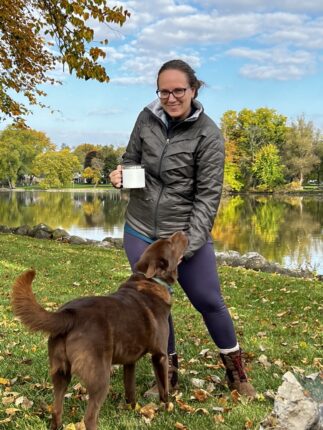 Meet Dr. Leslie Golden, a dedicated obesity medicine physician whose personal struggles with obesity fueled her mission to provide compassionate and holistic care.
Meet Dr. Leslie Golden, a dedicated obesity medicine physician whose personal struggles with obesity fueled her mission to provide compassionate and holistic care.
With over five years in the field, Dr. Golden’s professional journey in obesity medicine began with a desire to understand and address the root causes of her patients’ weight-related challenges. Today, she operates her own private practice called Weight in Gold Wellness, which focuses solely on obesity care with the mantra that a person’s weight should never define their self-worth. Her compassionate approach to treatment is rooted in the empathy she had to cultivate for herself along the way in her personal journey with obesity.
Dr. Golden is also a passionate supporter of the OAC and recently attended her first Your Weight Matters Convention in Orlando, Florida. She not only integrates the OAC’s materials into her personal approach to obesity treatment but also estimates that she recommends at least 40-50% of her patients to get involved with the OAC. When asked which resources are her favorite, she listed almost all of them — from the OAC’s brochures, guides, and Weight Matters Magazine to its webinars, annual Convention, and supportive community.
Dr. Golden shares more about her personal journey and approach to obesity care below.
How have your experiences with obesity influenced your decision to focus on obesity medicine?
My personal journey with obesity is the reason I decided to specialize in obesity medicine. I struggled with emotional eating, binge eating disorder and weight fluctuations, which ignited a desire in me to understand the intricacies of this complex condition. Experiencing firsthand the stigma and self-blame associated with obesity motivated me to pursue a more compassionate and informed approach to treatment. By combining my lived experience with professional knowledge, I strive to create a supportive and non-judgmental space for people facing similar struggles.
Upon discovering organizations like the Obesity Action Coalition (OAC) and Obesity Medicine Association (OMA), how did their education and resources change your perspective on obesity as a disease, and how did it impact the way you treat both yourself and your patients?
Discovering these organizations significantly shifted my understanding of obesity. The wealth of education and resources they provided illuminated the physiological and psychological aspects of obesity and challenging society’s misconceptions. This influenced the way I treat both myself and my patients by encouraging me to adopt a more holistic and empathetic approach. I began viewing obesity through a medical lens, utilizing evidence-based strategies and prioritizing individualized care over one-size-fits-all solutions.
How do you integrate OAC resources into your practice?
In addition to displaying OAC educational materials in my clinic’s waiting room, I incorporate OAC educational materials into patient consultations so that they have access to up-to-date and evidence-based information. The OAC’s advocacy efforts also inform my approach to destigmatizing obesity, which helps me empower patients to advocate for their health. Additionally, I encourage patients to explore OAC resources independently so they can find a sense of community and support beyond the clinical setting.
How do you help patients navigate their own internalized weight bias during the treatment process?
Addressing internalized weight bias is a crucial part of the treatment process. I work collaboratively with patients to identify and challenge their negative beliefs so they can have more self-compassion. Utilizing cognitive-behavioral techniques, we explore the origins of weight bias and develop coping strategies to navigate societal judgments. By emphasizing health over appearance and acknowledging the impact of external factors, we work towards dismantling internalized biases and promoting a positive mindset.
You actively refer a significant percentage of your patients to the OAC for support. What impact have you observed in patients who engage with OAC resources?
Patients who use the OAC’s resources have demonstrated noticeable positive changes in their weight and health journeys. The supportive community and evidence-based information provided by the OAC boost their self-efficacy and resilience. My patients feel empowered and less alone, which helps them follow the treatment plans we make together. The OAC’s emphasis on advocacy also inspires individuals to take an active role in their healthcare, which creates a more comprehensive and collaborative approach to managing obesity.
How do events like the OAC’s Convention help break down weight stigma and provide a safe space for individuals struggling with obesity?
By bringing together diverse voices, experiences and experts in the field, events like the OAC’s annual Convention challenge prevailing stereotypes and promote a better understanding of obesity. Attendees gain a sense of community, reinforcing the fact that they are not alone in their journey. The exchange of knowledge and personal stories helps destigmatize obesity, promote empathy, and help individuals navigate their challenges with support.
Do You Want to Share Your Story?
Whether you have a story about navigating obesity, facing weight stigma, or inspiring others, your voice is important. Visit the OAC’s story project at WeightoftheWorld.com to share yours today. Not sure what to say? Consider one of our question prompts to guide you.
If you would like your story to be featured in a future issue of Weight Matters Magazine, please email membership@obesityaction.org.

